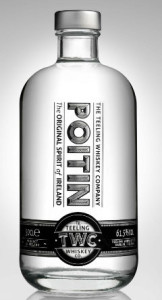By Richard Thomas
Irish whiskey is booming, with sales rising by double-digit numbers in recent years and interest sparking a new wave of small and mid-sized Irish distillery projects. Just as with a similar whiskey boom in the United States, that combination of whiskey-imbibing being cool again and a thriving craft distillery scene has brought what was once an illicit and shadowy liquor into the mainstream. As it is with legal moonshine in America, so it is with poitin in Ireland.
But Why Poitin?
The motivation to introduce an unaged whiskey like poitin is the same on both sides of the Atlantic. Sheer business logic dictates that however much a new distillery might like to ultimately sell fine, aged whiskeys, in the short term they need products on the market and revenue. This drives outfits like Glendalough to make gin and poitin, spirits that don’t need to spend years maturing in a warehouse.
Beyond making a near-term profit, culture and whiskey chic also drive poitin. Ireland has a rich tradition of homemade, illicit spirits, and contrary to what the skeptics say, not all of it was rotgut.
“There are stories of a famous woman called Katie Kearney in Ireland,” said Louise McGuane of Chapel Gate Distillery. “People would travel hundred of miles for her poitin. I can’t imagine anyone doing that for the stuff that doubled as muscle rub for the local football team in my youth.”
While Ireland has some very non-whiskey, rocket fuel-like expressions out there, such as the 90% abv Kockeen Hills Extra Gold (a literal substitute for gasoline in your tank), most of what falls under the poitin banner is meant as a sipping whiskey, strong, but also pleasant.
Add to that the novelty of trying something that used to require to know someone who could get it on the sly, and you have a trend. In another parallel with American white whiskey and moonshine, poitin has caught on with mixologists in trendy cocktail bars in Ireland and the UK. Some brands have even been picked up by supermarket chain Tesco.
Just Trendy Or Here To Stay?
Yet the problem with novelty is translating that interest into a lasting presence, and here Irish poitin encounters two difficulties that American moonshine does not. Ireland and the UK combined have a far smaller population than the US, and thus a smaller potential market, and liquor taxes in both island countries are far higher than in America.
Traditionally, a big part of why people bought poitin (or moonshine, for that matter) was to escape the taxman’s mark-up, and in the British Isles that mark-up is steep. Furthermore, whiskey fans on both sides of the Atlantic are frequently seen to complain that if the spirit isn’t aged, why should it cost €35 for a 500 ml bottle, more than many aged whiskeys?
Jack Teeling, founder of the Teeling Whiskey Company, recognizes the problem for poitin’s long term viability. “As an emerging legal industry, poitin has to find its place in the noisy world of white spirits.”
“Unfortunately we find that people in Ireland are buying it for the novelty factor,” Teeling said, “but in other markets like the UK it is definitely be bought for mixology and also the general interest in sipping un-aged Irish whiskey spirit.”
This is quite distinct from the experience of many American moonshine-makers, whose sustained, rapidly rising sales of recent years point to them becoming anything but a passing novelty. What is more, I found little in the way of a general enthusiasm for sipping on poitin during my own travels in Ireland.
Despite this, poitin won the coveted EU “geographical indications” (GI) status this year, protecting it from foreign imitators. On average, products with GI status see double the sales of Europe’s non-GI products. Also, poitin is starting to make its way around the world, even making some inroads in faraway Australia.
Poitin is certainly here to stay, but whether it becomes a very minor niche category remains to be seen. Ultimately, that may come down to how committed Ireland’s class of new distillers are to making and selling it. A major point in selling poitin is selling the very idea of poitin and creating its market, a difficult, long-term investment and a task already accomplished with aged whiskey.
I’ve been told by some American craft distillers that they are de-emphasizing their white whiskeys now that their bourbons and ryes are established. If Ireland were to go the same route, there won’t be the dozens of moonshine-only distilleries to carry on as there are in the US. In that event, legal Irish poitin would go back into the same obscure place it was in several years ago.
 The Whiskey Reviewer A World of Whiskey, Poured Every Weekday
The Whiskey Reviewer A World of Whiskey, Poured Every Weekday

